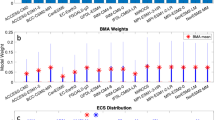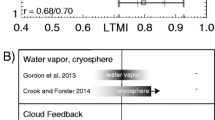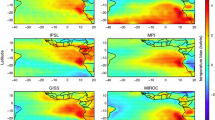Abstract
Despite decades of research, large multi-model uncertainty remains about the Earth’s equilibrium climate sensitivity to carbon dioxide forcing as inferred from state-of-the-art Earth system models (ESMs). Statistical treatments of multi-model uncertainties are often limited to simple ESM averaging approaches. Sometimes models are weighted by how well they reproduce historical climate observations. Here, we propose a novel approach to multi-model combination and uncertainty quantification. Rather than averaging a discrete set of models, our approach samples from a continuous distribution over a reduced space of simple model parameters. We fit the free parameters of a reduced-order climate model to the output of each member of the multi-model ensemble. The reduced-order parameter estimates are then combined using a hierarchical Bayesian statistical model. The result is a multi-model distribution of reduced-model parameters, including climate sensitivity. In effect, the multi-model uncertainty problem within an ensemble of ESMs is converted to a parametric uncertainty problem within a reduced model. The multi-model distribution can then be updated with observational data, combining two independent lines of evidence. We apply this approach to 24 model simulations of global surface temperature and net top-of-atmosphere radiation response to abrupt quadrupling of carbon dioxide, and four historical temperature data sets. Our reduced order model is a 2-layer energy balance model. We present probability distributions of climate sensitivity based on (1) the multi-model ensemble alone and (2) the multi-model ensemble and observations.




Similar content being viewed by others
References
Aldrin M, Holden M, Guttorp P et al (2012) Bayesian estimation of climate sensitivity based on a simple climate model fitted to observations of hemispheric temperatures and global ocean heat content. Environmetrics 23:253–271
Anderson TL, Charlson RJ, Schwartz SE et al (2003) Climate Forcing by Aerosols - a Hazy Picture. Science 300:1103–1104
Andrews T, Gregory JM, Webb MJ, Taylor KE (2012) Forcing, feedbacks and climate sensitivity in CMIP5 coupled atmosphere-ocean climate models. Geophys Res Lett 39:L09712
Annan JD, Hargreaves JC (2006) Using multiple observationally-based constraints to estimate climate sensitivity. Geophys Res Lett 33:6–9
Berliner LM (1996) Hierarchical Bayesian Time Series Models. In: Maximum Entropy and Bayesian Methods. Springer Netherlands, Dordrecht, pp 15–22
Berliner LM, Kim Y (2008) Bayesian Design and Analysis for Superensemble-Based Climate Forecasting. J Clim 21:1891–1910
Bhat KS, Haran M, Terando A, Keller K (2011) Climate Projections Using Bayesian Model Averaging and Space–Time Dependence. J Agric Biol Environ Stat 16:606–628
Carpenter B, Lee D, Brubaker MA et al (2017) Stan: A Probabilistic Programming Language. J Stat Softw 76:1–32
Charney JG, et al. (1979) Carbon Dioxide and Climate: A Scientific Assessment. Report of an ad hoc study group on carbon dioxide and climate, National Research Council, National Academy of Sciences
Collins M, Knutti R, Arblaster J et al (2013) Long-term Climate Change: Projections, Commitments and Irreversibility. In: Stocker TF et al (eds) Climate Change 2013: The Physical Science Basis. Contribution of Working Group I to the Fifth Assessment Report of the Intergovernmental Panel Climate Change. Cambridge University Press, Cambridge, pp 1029–1139
DelSole T, Yang X, Tippett MK (2013) Is unequal weighting significantly better than equal weighting for multi-model forecasting? Q J R Meteorol Soc 139:176–183
Forest CE, Stone PH, Sokolov AP, et al (2002) Quantifying uncertainties in climate system properties with the use of recent climate observations. Science (80-) 295:113–117
Furrer R, Sain SR, Nychka D, Meehl GA (2007) Multivariate Bayesian analysis of atmosphere–ocean general circulation models. Environ Ecol Stat 14:249–266
Gelman A, Carlin JB, Stern HS et al (2013) Bayesian Data Analysis. CRC Press, Taylor and Francis Group, Boca Raton
Gelman A, Hill J (2006) Data analysis using regression and multilevel/hierarchical models, 1st edn. Cambridge University Press, New York
Geoffroy O, Saint-Martin D, Olivié DJL et al (2013) Transient Climate Response in a Two-Layer Energy-Balance Model. Part I: Analytical Solution and Parameter Calibration Using CMIP5 AOGCM Experiments. J Clim 26:1841–1857
Giorgi F, Mearns LO (2002) Calculation of Average, Uncertainty Range, and Reliability of Regional Climate Changes from AOGCM Simulations via the "Reliability Ensemble Averaging" (REA) Method. J Clim 15:1141–1158
Gregory JM, Andrews T (2016) Variation in climate sensitivity and feedback parameters during the historical period. Geophys Res Lett 43:3911–3920
Hegerl GC, Crowley TJ, Hyde WT, Frame DJ (2006) Climate sensitivity constrained by temperature reconstructions over the past seven centuries. Nature 440:1029–1032
Held IM, Winton M, Takahashi K et al (2010) Probing the Fast and Slow Components of Global Warming by Returning Abruptly to Preindustrial Forcing. J Clim 23:2418–2427
Jun M, Knutti R, Nychka DW (2008) Spatial Analysis to Quantify Numerical Model Bias and Dependence. J Am Stat Assoc 103:934–947
Kang EL, Cressie N, Sain SR (2012) Combining outputs from the North American Regional Climate Change Assessment Program by using a Bayesian hierarchical model. J R Stat Soc C Appl 61:291–313
Klocke D, Pincus R, Quaas J (2011) On constraining estimates of climate sensitivity with present-day observations through model weighting. J Clim 24:6092–6099
Knutti R (2008) Should we believe model predictions of future climate change? Philos Trans R Soc A 366:4647–4664
Knutti R (2010) The end of model democracy? Clim Chang 102:395–404
Knutti R, Furrer R, Tebaldi C et al (2010) Challenges in Combining Projections from Multiple Climate Models. J Clim 23:2739–2758
Knutti R, Rugenstein MAA (2015) Feedbacks, climate sensitivity and the limits of linear models. Philos Trans R Soc A 373:2015146
Masson D, Knutti R (2011) Climate model genealogy. Geophys Res Lett 38:L08703
Meinshausen M, Raper SCB, Wigley TML (2011) Emulating coupled atmosphere-ocean and carbon cycle models with a simpler model, MAGICC6 – Part 1: Model description and calibration. Atmos Chem Phys 11:1417–1456
Min S-K, Hense A (2006) A Bayesian approach to climate model evaluation and multi-model averaging with an application to global mean surface temperatures from IPCC AR4 coupled climate models. Geophys Res Lett 33:L08708
Myles A, Frame DJ (2007) Call Off the Quest. Science 318:582–583
Räisänen J, Ruokolainen L, Ylhäisi J (2010) Weighting of model results for improving best estimates of climate change. Clim Dyn 35:407–422
Reifen C, Toumi R (2009) Climate projections: Past performance no guarantee of future skill? Geophys Res Lett 36:L13704
Richardson M, Cowtan K, Hawkins E, Stolpe MB (2016) Reconciled climate response estimates from climate models and the energy budget of Earth Climate risks increase with mean global temperature. Nat Clim Chang 6:931–935
Roberts GO, Rosenthal JS (2009) Examples of Adaptive MCMC. J Comput Graph Stat 18:349–367
Rogelj J, Meinshausen M, Knutti R (2012) Global warming under old and new scenarios using IPCC climate sensitivity range estimates. Nat Clim Chang 2:248–253
Sain SR, Furrer R, Cressie N (2011) A spatial analysis of multivariate output from regional climate models. Ann Appl Stat 5:150–175
Schmidt GA, Bader D, Donner LJ et al (2017) Practice and philosophy of climate model tuning across six US modeling centers. Geosci Model Dev 10:3207–3223
Sherwood SC, Bony S, Dufresne J-L (2014) Spread in model climate sensitivity traced to atmospheric convective mixing. Nature 505:37–42
Tebaldi C, Knutti R (2007) The use of the multi-model ensemble in probabilistic climate projections. Philos Trans R Soc A 365:2053–2075
Tebaldi C, Smith RL, Nychka D et al (2005) Quantifying Uncertainty in Projections of Regional Climate Change: A Bayesian Approach to the Analysis of Multimodel Ensembles. J Clim 18:1524–1540
Tian B (2015) Spread of model climate sensitivity linked to double-Intertropical Convergence Zone bias. Geophys Res Lett 42:4133–4141
Urban NM, Holden PB, Edwards NR et al (2014) Historical and future learning about climate sensitivity. Geophys Res Lett 41:2543–2552
Urban NM, Keller K (2009) Complementary observational constraints on climate sensitivity. Geophys Res Lett 36:L04708
Urban NM, Keller K (2010) Probabilistic hindcasts and projections of the coupled climate, carbon cycle and Atlantic meridional overturning circulation system: a Bayesian fusion of century-scale observations with a simple model. Tellus A 62:737–750
Webb MJ, Lambert FH, Gregory JM (2013) Origins of differences in climate sensitivity, forcing and feedback in climate models. Clim Dyn 40:677–707
Wigley TML, Raper SCB (1992) Implications for climate and sea level of revised IPCC emissions scenarios. Nature 357:293–300
Wikle CK, Berliner LM, Cressie N (1998) Hierarchical Bayesian space-time models. Environ Ecol Stat 5:117–154
Acknowledgments
This research was supported by the U.S. Department of Energy (DOE) Office of Science (Biological and Environmental Research), Early Career Research program. We acknowledge the World Climate Research Programme’s Working Group on Coupled Modeling, responsible for CMIP, and thank the climate modeling groups for producing and making available their model output. For CMIP, the DOE Program for Climate Model Diagnosis and Intercomparison (PCMDI) provides coordinating support and led development of software infrastructure in partnership with the Global Organization for Earth System Science Portals. The data and code used in this analysis can be made available upon request. Please direct requests to the corresponding author.
Author information
Authors and Affiliations
Corresponding author
Electronic supplementary material
ESM 1
(DOCX 10983 kb)
Rights and permissions
About this article
Cite this article
Jonko, A., Urban, N.M. & Nadiga, B. Towards Bayesian hierarchical inference of equilibrium climate sensitivity from a combination of CMIP5 climate models and observational data. Climatic Change 149, 247–260 (2018). https://doi.org/10.1007/s10584-018-2232-0
Received:
Accepted:
Published:
Issue Date:
DOI: https://doi.org/10.1007/s10584-018-2232-0




